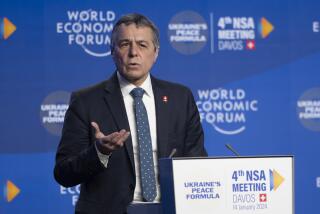Shultz, Shevardnadze to Meet on Treaty
- Share via
WASHINGTON — Secretary of State George P. Shultz and Soviet Foreign Minister Eduard A. Shevardnadze will meet today in Geneva to iron out late-developing differences over the arms treaty that was signed in December in Washington and to try to make progress toward a more ambitious arms agreement.
It will be their last preparatory meeting before the summit conference later this month in Moscow.
They also will discuss regional issues, a senior U.S. official said Tuesday, with the focus on the conflict in Angola. New hope for ending the 13-year-old civil war there arose last week after a U.S.-sponsored session in London, where South Africa and Cuba, whose troops support opposite sides, sat down to their first direct meeting. U.S. and Angolan officials also took part.
A Soviet representative observed the talks, which U.S. officials interpreted as Moscow’s blessing on the negotiations and its apparent intent to follow the same monitoring pattern as it did in the successful Afghan negotiations.
The senior official, briefing reporters Tuesday, expressed optimism that the Geneva meeting will settle the “very technical issues” on verification that are holding up Senate ratification of the U.S.-Soviet accord on medium-range missiles (300 to 3,400 miles). Shevardnadze said as he arrived Tuesday in Geneva that he believes the problems have been basically resolved.
Senate leaders decided Monday to hold up consideration of the treaty on intermediate nuclear forces (INF) until the verification difficulties have been cleared up.
Nine such issues had been outstanding. One dealt with the size of the smallest item subject to inspection: the entire missile, as the Soviets have said, or each stage of that missile, as the United States has insisted. Another concerns the legal status of U.S.-made Pershing 1-A missiles owned by West Germany.
Disputes ‘Inevitable’
Although the senior official said the disputes are “legitimate and must be resolved,” they are also “inevitable” in view of the complexity of translating the treaty language into implementing details. Some of them appear to have been resolved in diplomatic exchanges between Moscow and Washington, but others remain.
The official expressed confidence that all of the issues will be solved during the two-day Geneva meeting when experts from both sides sit down to discuss them, with Shultz and Shevardnadze “watching over the process.”
White House spokesman Marlin Fitzwater said: “We are still of the view that it is possible to have the treaty ratified prior to the Moscow summit.” Fitzwater, indicating President Reagan’s support for the delay in Senate consideration of the treaty, said that “we feel this is a prudent and reasonable course of action.”
“There is unanimity between the Administration and the bipartisan Senate leadership that these problems should be satisfactorily and promptly resolved prior to ratification,” he told reporters, adding: “The Administration has made clear to the Soviets the need for an expeditious solution.”
However, there is no certainty that the treaty will be ratified in time for the May 29-June 2 summit meeting, even if these last-minute difficulties are worked out this week. Reagan and Soviet leader Mikhail S. Gorbachev had hoped to exchange the formal documents of ratification at that meeting.
Reagan and Gorbachev also had wanted to sign a new strategic arms reduction treaty--commonly referred to as START--at the summit, but those negotiations are at an impasse. Shultz will not carry any new proposals to the Soviets this week, the official said.
Rather than a new treaty, U.S. and Soviet officials are now considering ways for the two leaders to codify progress toward a strategic arms agreement, which would cut long-range offensive nuclear weapons by 50%.
Times staff writer James Gerstenzang contributed to this story.
More to Read
Sign up for Essential California
The most important California stories and recommendations in your inbox every morning.
You may occasionally receive promotional content from the Los Angeles Times.










